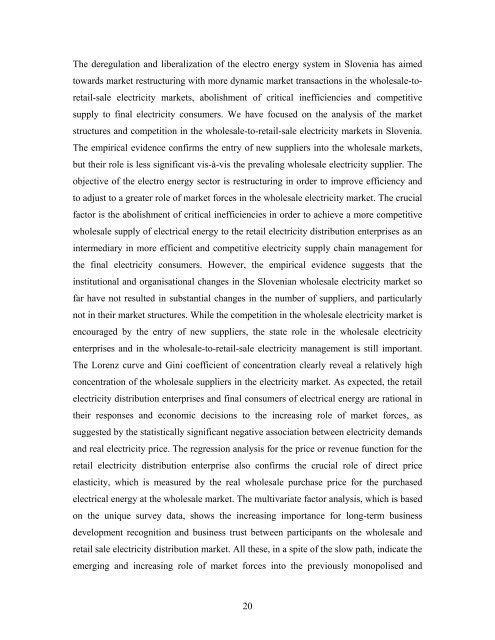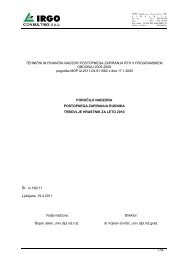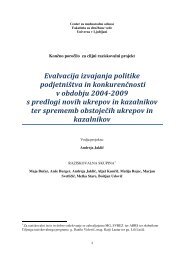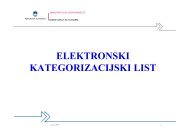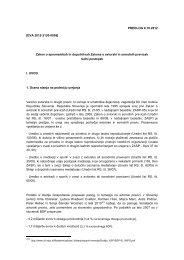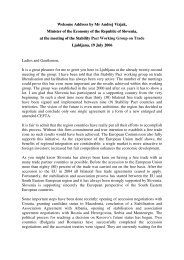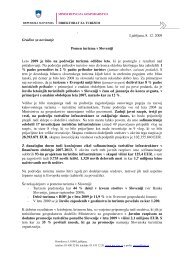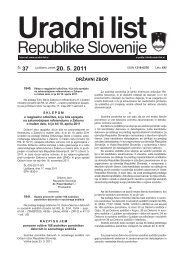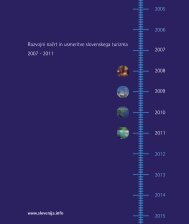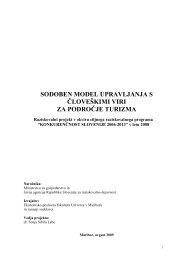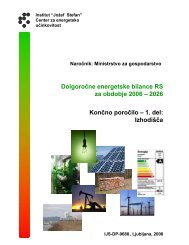Liberalisation of electricity market: the case of Slovenia
Liberalisation of electricity market: the case of Slovenia
Liberalisation of electricity market: the case of Slovenia
Create successful ePaper yourself
Turn your PDF publications into a flip-book with our unique Google optimized e-Paper software.
The deregulation and liberalization <strong>of</strong> <strong>the</strong> electro energy system in <strong>Slovenia</strong> has aimedtowards <strong>market</strong> restructuring with more dynamic <strong>market</strong> transactions in <strong>the</strong> wholesale-toretail-sale<strong>electricity</strong> <strong>market</strong>s, abolishment <strong>of</strong> critical inefficiencies and competitivesupply to final <strong>electricity</strong> consumers. We have focused on <strong>the</strong> analysis <strong>of</strong> <strong>the</strong> <strong>market</strong>structures and competition in <strong>the</strong> wholesale-to-retail-sale <strong>electricity</strong> <strong>market</strong>s in <strong>Slovenia</strong>.The empirical evidence confirms <strong>the</strong> entry <strong>of</strong> new suppliers into <strong>the</strong> wholesale <strong>market</strong>s,but <strong>the</strong>ir role is less significant vis-à-vis <strong>the</strong> prevaling wholesale <strong>electricity</strong> supplier. Theobjective <strong>of</strong> <strong>the</strong> electro energy sector is restructuring in order to improve efficiency andto adjust to a greater role <strong>of</strong> <strong>market</strong> forces in <strong>the</strong> wholesale <strong>electricity</strong> <strong>market</strong>. The crucialfactor is <strong>the</strong> abolishment <strong>of</strong> critical inefficiencies in order to achieve a more competitivewholesale supply <strong>of</strong> electrical energy to <strong>the</strong> retail <strong>electricity</strong> distribution enterprises as anintermediary in more efficient and competitive <strong>electricity</strong> supply chain management for<strong>the</strong> final <strong>electricity</strong> consumers. However, <strong>the</strong> empirical evidence suggests that <strong>the</strong>institutional and organisational changes in <strong>the</strong> <strong>Slovenia</strong>n wholesale <strong>electricity</strong> <strong>market</strong> s<strong>of</strong>ar have not resulted in substantial changes in <strong>the</strong> number <strong>of</strong> suppliers, and particularlynot in <strong>the</strong>ir <strong>market</strong> structures. While <strong>the</strong> competition in <strong>the</strong> wholesale <strong>electricity</strong> <strong>market</strong> isencouraged by <strong>the</strong> entry <strong>of</strong> new suppliers, <strong>the</strong> state role in <strong>the</strong> wholesale <strong>electricity</strong>enterprises and in <strong>the</strong> wholesale-to-retail-sale <strong>electricity</strong> management is still important.The Lorenz curve and Gini coefficient <strong>of</strong> concentration clearly reveal a relatively highconcentration <strong>of</strong> <strong>the</strong> wholesale suppliers in <strong>the</strong> <strong>electricity</strong> <strong>market</strong>. As expected, <strong>the</strong> retail<strong>electricity</strong> distribution enterprises and final consumers <strong>of</strong> electrical energy are rational in<strong>the</strong>ir responses and economic decisions to <strong>the</strong> increasing role <strong>of</strong> <strong>market</strong> forces, assuggested by <strong>the</strong> statistically significant negative association between <strong>electricity</strong> demandsand real <strong>electricity</strong> price. The regression analysis for <strong>the</strong> price or revenue function for <strong>the</strong>retail <strong>electricity</strong> distribution enterprise also confirms <strong>the</strong> crucial role <strong>of</strong> direct priceelasticity, which is measured by <strong>the</strong> real wholesale purchase price for <strong>the</strong> purchasedelectrical energy at <strong>the</strong> wholesale <strong>market</strong>. The multivariate factor analysis, which is basedon <strong>the</strong> unique survey data, shows <strong>the</strong> increasing importance for long-term businessdevelopment recognition and business trust between participants on <strong>the</strong> wholesale andretail sale <strong>electricity</strong> distribution <strong>market</strong>. All <strong>the</strong>se, in a spite <strong>of</strong> <strong>the</strong> slow path, indicate <strong>the</strong>emerging and increasing role <strong>of</strong> <strong>market</strong> forces into <strong>the</strong> previously monopolised and20


